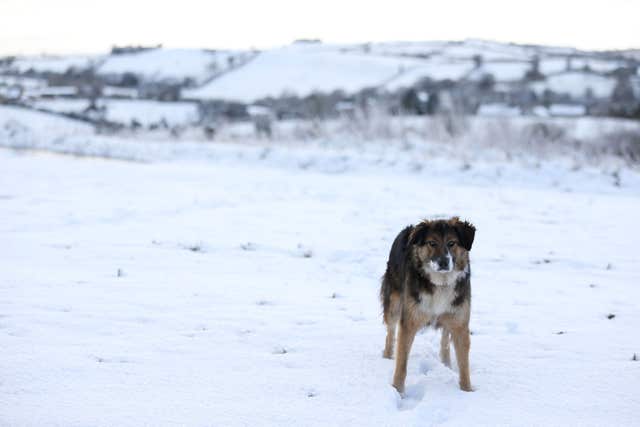
Householders are being urged to look out for wildlife and domestic pets as the cold weather grips.
Birds can struggle to find food during the winter months, so nature-lovers can help them stay strong in the cold weather by leaving out extra food, such as suitable seeds and grains, net-free fat or suet balls, apples and pears.
They should only be fed peanuts which are unsalted, fresh and sold for human consumption or by a reputable feed shop, and should be chopped up or put in good quality mesh feeders, the RSPCA said.
Homeowners are also advised to keep bird baths free of ice, leave out bowls of clean water and keep feeders and water bowls clean to prevent disease spreading.
At this time of year, life can be tough for birds. A cold snap can mean they need more energy. Discover more about feeding birds in your garden: https://t.co/6Xihrh2T1v 🐦❄️ pic.twitter.com/Ca7PrFlgOH
— RSPB (@Natures_Voice) February 25, 2018
Garden ponds need to be checked every day to make sure the surface is not entirely frozen as poisonous gases can build up under the ice, the RSPCA said.
Breaking ice can harm fish, so people should should place a saucepan of hot water on the surface to gently melt a hole, but should never pour boiling water straight on to the pond or use antifreeze or salt to thaw ponds or birdbaths.
Closer to home, pets also need looking after in the cold, snowy conditions.
Rabbit owners should consider moving hutches indoors or into sheds, outhouses or unused garages when temperatures start to reach freezing, while guinea pigs should be housed indoors when temperatures are below 15C (59F).
If owners have to leave their rabbits and guinea pigs outside they must have lots of extra bedding and homes protected from adverse weather, the RSPCA said.

Cats need to have constant access to the house or warm inside areas, while pet dogs need to be kept away from frozen ponds, lakes or rivers which can pose a danger, and owners should make sure their paws do not get impacted with snow.
People who keep pet birds in aviaries, coops or runs should also protect them from the cold weather, and livestock and horses need adequate shelter and extra feed, while water troughs and buckets should be kept clear of ice.
RSPCA scientific officer Llewelyn Lowen said: “As the weather turns colder it is important to think about what we can do to help our animal friends.
“Every year, between 1,000 and 2,000 wild animals are brought into RSPCA wildlife centres in December, January and February suffering from dehydration, hunger and cold.
“A few little changes to your everyday routine can really make a difference to animals.
“For example, a little bit of extra food left out for a hungry bird may be the help it needs to last through a spate of frosty weather or, if you have rabbits kept outside, you will need to provide them with lots of extra bedding and their home should be placed in a sheltered position, facing away from the prevailing wind and rain.”


Comments: Our rules
We want our comments to be a lively and valuable part of our community - a place where readers can debate and engage with the most important local issues. The ability to comment on our stories is a privilege, not a right, however, and that privilege may be withdrawn if it is abused or misused.
Please report any comments that break our rules.
Read the rules here